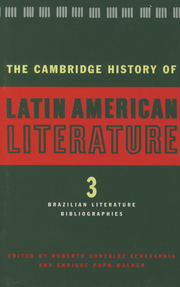Book contents
- Frontmatter
- Introduction to Volume 3
- 1 The literary historiography of Brazil
- 2 Colonial Brazilian literature
- 3 Brazilian poetry from the 1830s to the 1880s
- 4 Brazilian poetry from 1878 to 1902
- 5 The Brazilian theatre up to 1900
- 6 Brazilian fiction from 1800 to 1855
- 7 The Brazilian novel from 1850 to 1900
- 8 Brazilian fiction from 1900 to 1945
- 9 Brazilian prose from 1940 to 1980
- 10 The Brazilian short story
- 11 Brazilian poetry from 1900 to 1922
- 12 Brazilian poetry from Modernism to the 1990s
- 13 The Brazilian theatre in the twentieth century
- 14 Brazilian popular literature (the literatura de cordel)
- 15 Literary criticism in Brazil
- 16 The essay: architects of Brazilian national identity
- 17 The Brazilian and the Spanish American literary traditions: a contrastive view
- Bibliography
- Index
- References
16 - The essay: architects of Brazilian national identity
Published online by Cambridge University Press: 28 March 2008
- Frontmatter
- Introduction to Volume 3
- 1 The literary historiography of Brazil
- 2 Colonial Brazilian literature
- 3 Brazilian poetry from the 1830s to the 1880s
- 4 Brazilian poetry from 1878 to 1902
- 5 The Brazilian theatre up to 1900
- 6 Brazilian fiction from 1800 to 1855
- 7 The Brazilian novel from 1850 to 1900
- 8 Brazilian fiction from 1900 to 1945
- 9 Brazilian prose from 1940 to 1980
- 10 The Brazilian short story
- 11 Brazilian poetry from 1900 to 1922
- 12 Brazilian poetry from Modernism to the 1990s
- 13 The Brazilian theatre in the twentieth century
- 14 Brazilian popular literature (the literatura de cordel)
- 15 Literary criticism in Brazil
- 16 The essay: architects of Brazilian national identity
- 17 The Brazilian and the Spanish American literary traditions: a contrastive view
- Bibliography
- Index
- References
Summary
For more than a century Brazilian intellectuals have agonized over their country’s national identity. Until the 1950s they attempted to capture its essence by relying on colorful language and historical allusions. Building on a paradoxical combination of faith and doubt, they wrestled especially with the troublesome question of how racial intermixture had affected the Brazilian character. Such a preoccupation had been common among elite thinkers of Latin America since the late nineteenth century, when the theories of white racial superiority arrived with the prestige conferred by North Atlantic “science.” The questions remained constant. Who are we? How have we become this way? Does a racially mixed people have a future in the “civilized” world?
This chapter focuses on some of the most influential Brazilian writers who have taken up these themes. They all tried to define Brazil’s national identity in both a cultural and a political dimension. For each historical period, the context is sketched and the focus turns to one or two of the period’s most widely read books on Brazilian national identity. All of these works went through numerous printings and are still read in Brazil.
The years from 1870 to 1889 saw the Brazilian empire in decline. Despite Brazilian victory in the Paraguayan War (1865–1870), Emperor Dom Pedro II faced increasing opposition at home from a republican movement. In 1889 the higher military, endorsing republican ideology, deposed the only genuine monarchy that nineteenth-century Latin America had ever produced. These years also saw the rapid rise of coffee as Brazil’s chief export, restricted largely to the south central areas, especially the states of Rio de Janeiro, Minas Gerais, and São Paulo.
- Type
- Chapter
- Information
- The Cambridge History of Latin American Literature , pp. 345 - 362Publisher: Cambridge University PressPrint publication year: 1996
References
- 1
- Cited by



